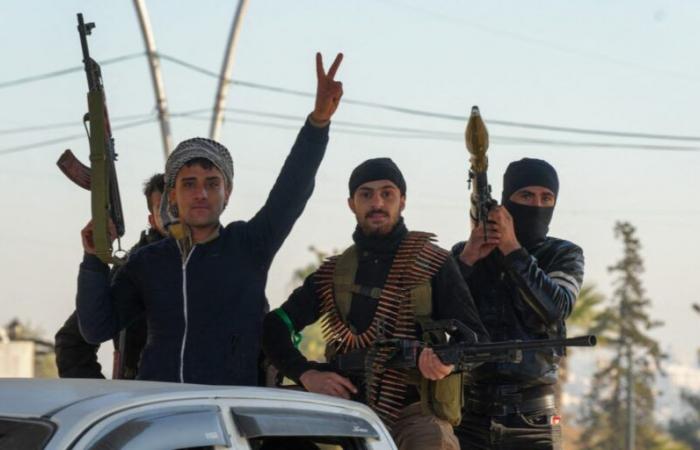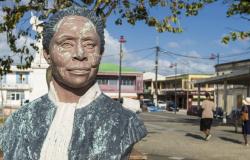Syrian President Bashar al-Assad denounced on Monday an attempt to “redraw” the map of the Middle East, after a dazzling offensive by rebels who succeeded in taking large areas of northern Syria from government forces. For the first time since the start of the war in 2011, the Assad regime has completely lost control of Aleppo, Syria's second city, a stinging setback inflicted by a coalition of rebel groups dominated by radical Islamists.
More than 450 deaths since the offensive of November 27, 2024
In response, Syrian and Russian planes carried out strikes on areas held by these groups in the province of Idleb (northwest) and in the neighboring province of Aleppo, killing 15 civilians including children, according to the OSDH. AFPTV footage showed armed rebels patrolling the streets of Aleppo, the major city in northern Syria, near the historic citadel or international airport. Some pose in front of an armored vehicle abandoned by the army, others tear up a Syrian flag or a portrait of Bashar al-Assad. Even though most of the streets appear empty, Syrians came out to cheer the arrival of these fighters.
The rebels took government buildings, prisons, Aleppo international airport and a military airfield “without encountering significant resistance”, according to the Syrian Observatory for Human Rights (OSDH), which has a vast network of sources in Syria. In a telephone interview with his Iranian counterpart, Massoud Pezeshkian, Bashar al-Assad declared that the “terrorist escalation” aimed at “trying to divide the region, to crumble its states and to redraw the regional map in accordance with the interests and objectives of America and the West.
Bashar al-Assad, supported by Iran and Russia, sought to obtain the support of his allies in the face of the assault which has left more than 457 dead since the start of the rebel offensive on November 27, the majority of them combatants but also including more than 72 civilians, according to the OSDH. According to the Kremlin, Russian President Vladimir Putin and Massoud Pezeshkian affirmed their “unconditional” support for Bashar al-Assad and called for coordination with Turkey, which supports rebel groups.
To everyone's surprise, the radical Islamist group Hayat Tahrir al-Sham (HTS) and rebel factions, some of which supported by Ankara, launched their offensive from the province of Idlib. They quickly seized dozens of localities as well as the city of Aleppo with the exception of its northern districts inhabited by Kurds. Syria has been divided by the civil war into several zones of influence, where the belligerents are supported by different regional and international powers.
And the violence of the last few days, the first of this magnitude since 2020, raises fears of a resumption of large-scale hostilities. Turkey, which borders Syria, as well as Iran, Russia and the United States have a military presence in Syria, where the war started with the brutal repression of pro-democracy demonstrations has left around half a million dead. The start of the rebel offensive coincided with the entry into force of a ceasefire between Israel and Lebanese Hezbollah, an ally of Bashar al-Assad and Iran which emerged weakened from the war in Lebanon.
Russia and Iran alongside Bashar al-Assad
It was thanks to the military support of Russia, Iran and Hezbollah that the Assad regime succeeded in reversing the course of the war in 2015 by retaking a large part of the territory and in 2016 the entirety of Aleppo. . Preoccupied today with its war against Ukraine, Russia, which has several bases in Syria, has said it wants to help Bashar al-Assad and his forces to “repel” the rebels. The OSDH reported Russian strikes on the city of Aleppo.
The Syrian army, for its part, has reported in the last 24 hours Syrian and Russian aerial and artillery bombardments against “terrorist positions, depots and supply lines” in the provinces of Aleppo and Idlib. . “Our armed forces are advancing towards several axes in the provinces of Aleppo, Hama and Idlib to surround the terrorists and chase them away,” she added in a statement. Fighting is also between pro-government and rebel forces in the province of Hama, according to the Observatory.
HTS and rebels control a large part of Idlib province, as well as parts of Aleppo, Hama and Latakia provinces. Before their offensive, northwest Syria enjoyed an uneasy calm under a ceasefire established in 2020, under the sponsorship of Ankara and Moscow. On Sunday, the United States, France, Germany and the United Kingdom called for de-escalation in Syria in a joint statement.
The United States, which also has soldiers on the ground in northern Syria, supports the Kurdish-dominated Syrian Democratic Forces (SDF), which fought the jihadist group Islamic State (IS). On another front, pro-Turkish rebel groups on Sunday chased the SDF from Tal-Rifaat in the north of Aleppo province. The SDF controls large areas of northern Syria, where Syrian Kurds have established an autonomous administration. Their leader, Mazloum Abdi, said his forces were working to evacuate Kurdish civilians “safely” from areas of Aleppo province, including Tal-Rifaat.






